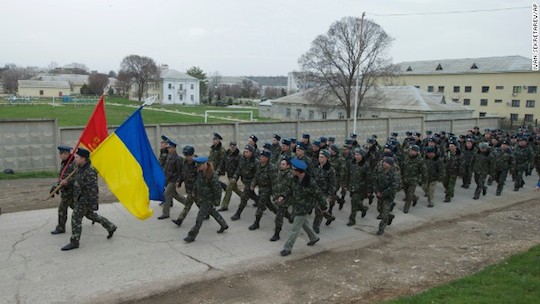We run our website the way we wished the whole internet worked: we provide high quality original content with no ads. We are funded solely by your direct support. Please consider supporting this project.
The Kingdom, Just War Theory, and Ukraine
 History textbooks often read like surveys of how countries handled war with other nations. The stuff between the conflicts reads like precursors and aftermath to the history-making actions of war. Now we observe the rising tension between Russia and Ukraine along with other world leaders as they try to determine how to respond. Sadly, church history also reads like God’s people have been full participants in the ups and downs of war, as if it is the church’s duty to join forces with the “just” side. If we determine that a war is just, then Christians have the right and even the duty to support it. This is the common way we have been taught in the Christian church to think about war. However, we don’t often think about where this line of reasoning originates, and rarely do we ever question its validity. Here are some thoughts about this from Greg:
History textbooks often read like surveys of how countries handled war with other nations. The stuff between the conflicts reads like precursors and aftermath to the history-making actions of war. Now we observe the rising tension between Russia and Ukraine along with other world leaders as they try to determine how to respond. Sadly, church history also reads like God’s people have been full participants in the ups and downs of war, as if it is the church’s duty to join forces with the “just” side. If we determine that a war is just, then Christians have the right and even the duty to support it. This is the common way we have been taught in the Christian church to think about war. However, we don’t often think about where this line of reasoning originates, and rarely do we ever question its validity. Here are some thoughts about this from Greg:
For the first three centuries of the church, Christians understood that it was their Kingdom duty to follow Jesus’ example of forgoing the use of violence and expressing God’s self-sacrificial love toward enemies. Unfortunately, this mindset was the first thing we lost when the Church acquired political power in the fourth century. Because many leaders viewed this political power as a blessing from God rather than a temptation from the enemy, Jesus’ refusal to use coercive power had to be radically rethought.
Augustine employed his formidable intellectual skills toward this end. He speculated that Jesus’ decision to suffer unjustly rather than use coercive force was not intended to be a permanent example for all Christians to follow. Rather, he reasoned, Jesus had to suffer and die unjustly because he was the Savior, and his suffering and death were necessary in order for us to be freed from the devil and reconciled to God. Now that this has been accomplished, however, and now that God (allegedly) had given Christians the power of the sword, it was not only permissible for Christians to use violence when the cause was “just”, they had a responsibility before God to do so.
This was the beginning of what’s called the ‘just war’ tradition within Christendom.
Now, we could at this point debate the relative merits of various versions of just war theory as applied to nations. Under what circumstances is a country justified in going to war? What warfare tactics are justified once a nation is involved in war? Some would even want to debate how various just war theories might be applied to a nation’s war on crime inside its own borders.
I have no problem with people applying just war theory in these ways. Since the New Testament assumes the kingdoms of the world will rely on the power of the sword, it may (or may not) be helpful to debate what constitutes a just use of the sword. There’s no inconsistency in a person holding that following Jesus entails that one should never engage in violence while also believing that there may be circumstances in which, as a last resort, nations may be justified in going to war.
My issues with just war theory arise when people follow Augustine’s lead and think it has something to say about how Kingdom people respond to enemies. For, contrary to Augustine, the New Testament is as clear as it can be that Kingdom people are called to follow Jesus’ example of sacrificing themselves for enemies rather than resorting to violence to resist or conquer them.
Jesus’ willingness to suffer out of love for his enemies rather than use coercive force against them is consistently identified in the New Testament as the ultimate expression of God’s love and the ultimate means by which the Powers are defeated. It’s what Calvary is all about. And so, the willingness of Kingdom people to suffer out of love for our enemies rather than use coercive force against them must still be considered the ultimate expression of God’s love.
Category: Essays
Tags: Augustine, Current Events, Enemy Love, Essay, Just War, Non-Violence, War
Topics: Ethical, Cultural and Political Issues
Related Reading

How should evangelicals “do” theology?
A central debate among evangelical theologians concerns the question of theological method. In other words, how should we “do” theology? All evangelical Christians believe the Bible is God’s inspired revelation. Thus, evangelicals agree that Scripture must form the foundation for theological thought. But Scripture is not the only factor to consider when doing theology. Many…

Responding to Critics of a Pacifist View of the Syrian Crisis-Part 2
United Nations Photo via Compfight Yesterday I posted a response to Tyler Tully’s criticism of some of my thoughts on the Syrian crisis. The second blog I’d like to review is Two Friars and a Fool by Aric Clark. Like Tully, Aric approved of much of what I said, but also like Tully, he raised several…

When Free Will Meets Unfathomable Evil
In the face of tragedy Christians unfortunately tend to recite clichés that attempt to reassure people that, however terrible things seem, everything is unfolding according to God’s mysterious plan. We hear that “God has his reasons”; “God’s ways are not our ways”; “God is still on his throne”; “God doesn’t make mistakes,” and things of…

The Worst Heresy That Never Got Anyone Burned at the Stake
According to John’s Gospel, on the evening of his crucifixion Jesus clearly articulated the single-most important quality by which his followers would be recognized: “By this all men will know that you are my disciples, if you love (agape) one another” (John 13:35). Or again: “But I tell you, love your enemies and pray for…

Is Having the “Right” Theology the Core of Christianity?
Last week, we posted a piece by Greg that challenges the practice being violent “in the name of Jesus” toward others who err theologically. (Click here to read this post.) Being that this piece got a lot of attention, we thought it worthwhile to provide some further explication to this point, especially in the light…

Take America (& the World) Back for God?
Kai Schreiber via Compfight Recently Missio Alliance has hosted a series of posts entitled “Christianity and Violence.” Since Greg has written quite a lot on this topic from the point of view of pacifism, we thought it timely to weigh in on this topic. The following excerpt is quoted from his chapter, “Taking America Back…
